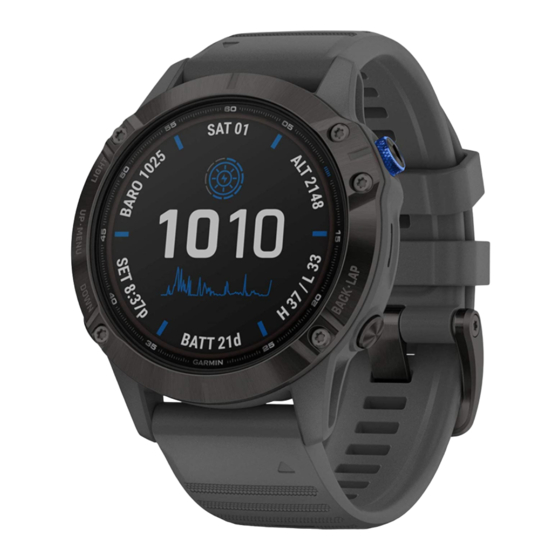Garmin Vivoactive 4 Manuel du propriétaire - Page 25
Parcourez en ligne ou téléchargez le pdf Manuel du propriétaire pour {nom_de_la_catégorie} Garmin Vivoactive 4. Garmin Vivoactive 4 29 pages. Turn on smart watch of 2022 - go wiki
Également pour Garmin Vivoactive 4 : Comment faire (8 pages), Manuel du propriétaire (38 pages)

2
Hold
for one second to turn on the device.
Restoring All Default Settings
You can reset all of the device settings to the factory default
values. You should sync your device with the Garmin Connect
app to upload your activity data before you reset the device.
1
Hold
.
2
Select
> System > Reset.
3
Select an option:
• To reset all of the device settings to the factory default
values and delete all user-entered information and activity
history, select Delete Data and Reset Settings.
NOTE: If you have set up a Garmin Pay wallet, this option
deletes the wallet from your device. If you have music
stored on your device, this option deletes your stored
music.
• To reset all of the device settings to the factory default
values and save all user-entered information and activity
history, select Reset Default Settings.
Acquiring Satellite Signals
The device may need a clear view of the sky to acquire satellite
signals.
1
Go outdoors to an open area.
The front of the device should be oriented toward the sky.
2
Wait while the device locates satellites.
It may take 30–60 seconds to locate satellite signals.
Improving GPS Satellite Reception
• Frequently sync the device to your Garmin Connect account:
◦ Connect your device to a computer using the USB cable
and the Garmin Express application.
◦ Sync your device to the Garmin Connect app using your
Bluetooth enabled smartphone.
◦ Connect your device to your Garmin Connect account
using a Wi‑Fi wireless network.
While connected to your Garmin Connect account, the device
downloads several days of satellite data, allowing it to quickly
locate satellite signals.
• Take your device outside to an open area away from tall
buildings and trees.
• Remain stationary for a few minutes.
Activity Tracking
For more information about activity tracking accuracy, go to
garmin.com/ataccuracy.
My step count does not seem accurate
If your step count does not seem accurate, you can try these
tips.
• Wear the device on your non-dominant wrist.
• Carry the device in your pocket when pushing a stroller or
lawn mower.
• Carry the device in your pocket when actively using your
hands or arms only.
NOTE: The device may interpret some repetitive motions,
such as washing dishes, folding laundry, or clapping your
hands, as steps.
The floors climbed amount does not seem accurate
Your device uses an internal barometer to measure elevation
changes as you climb floors. A floor climbed is equal to 3 m
(10 ft.).
• Avoid holding handrails or skipping steps while climbing
stairs.
Appendix
• In windy environments, cover the device with your sleeve or
jacket as strong gusts can cause erratic readings.
Improving the Accuracy of Intensity Minutes and
Calories
You can improve the accuracy of these estimates by walking or
running outside for 15 minutes.
1
From the watch face, swipe to view the My Day widget.
2
Select !.
3
Follow the on-screen instructions.
Getting More Information
• Go to
support.garmin.com
and software updates.
• Go to buy.garmin.com, or contact your Garmin dealer for
information about optional accessories and replacement
parts.
• Go to www.garmin.com/ataccuracy.
This is not a medical device. The pulse oximeter feature is
not available in all countries.
Appendix
Data Fields
Some data fields require ANT+ accessories to display data.
24-Hour Max.: The maximum temperature recorded in the last
24 hours from a compatible temperature sensor.
24-Hour Min.: The minimum temperature recorded in the last
24 hours from a compatible temperature sensor.
Average Cadence: Cycling. The average cadence for the
current activity.
Average Cadence: Running. The average cadence for the
current activity.
Average HR: The average heart rate for the current activity.
Average HR %Max.: The average percentage of maximum
heart rate for the current activity.
Average Lap Time: The average lap time for the current
activity.
Average Speed: The average speed for the current activity.
Average Swolf: The average swolf score for the current activity.
Your swolf score is the sum of the time for one length plus
the number of strokes for that length
page
12).
Avg. Dist./Stk.: The average distance traveled per stroke during
the current activity.
Avg. Pace: The average pace for the current activity.
Avg. Stks./Len.: The average number of strokes per length
during the current activity.
Avg. Stroke Rate: The average number of strokes per minute
(spm) during the current activity.
Cadence: Cycling. The number of revolutions of the crank arm.
Your device must be connected to a cadence accessory for
this data to appear.
Cadence: Running. The steps per minute (right and left).
Calories: The amount of total calories burned.
Dist. Per Stroke: The distance traveled per stroke.
Distance: The distance traveled for the current track or activity.
Elapsed Time: The total time recorded. For example, if you start
the timer and run for 10 minutes, then stop the timer for 5
minutes, then start the timer and run for 20 minutes, your
elapsed time is 35 minutes.
for additional manuals, articles,
(Swim Terminology,
23
